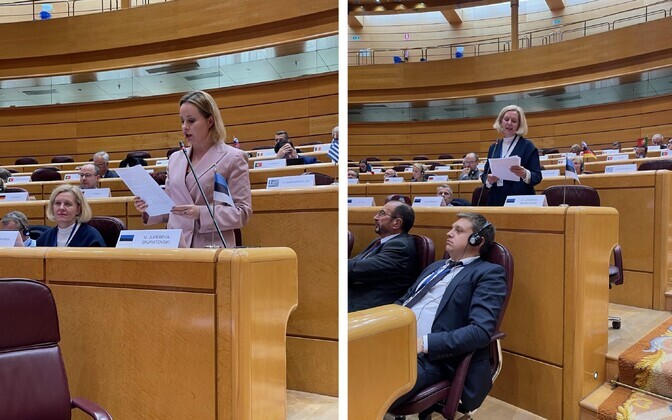
In her speech on Thursday, MP Annely Akkermann (Reform), chair of the Finance Committee of the Riigikogu, said that Estonia supports the coordination of EU countries’ economic and fiscal policies via equal and clear rules, according to a press release.
“We want to see the debt burden reduced and the deficit remain under three percent GDP, with an exception for the increase in defense spending in the current security situation,” Akkermann said.
“The backbone of inflation has been broken, but it is still slightly above the preferred level,” she explained. “Keeping inflation in check is a coin, with the [European] Central Bank’s policy of increasing interest rates on one side and countries’ moderation in increasing expenditures on the other.”
The Finance Committee chair added that member states may have different issues, but they nonetheless all have common aims. “We want to keep prices stable, to make our economies more modern and sustainable, to protect our nations against aggression,” she said. “The countries of Europe need to agree on fiscal policy. We have a common market of goods, labor and capital; we must also have common budget rules.”
In her own speech, MP Maria Jufereva-Skuratovski (Center), deputy chair of the European Union Affairs Committee, underlined that due to the recent healthcare, energy and security crises, the public debt of euro area countries has increased, and inflation remains unsustainably high.
“The next steps in economic and monetary policy must ensure the competitiveness of the EU economy, key investments and long-term sustainability,” Jufereva-Skuratovski said, pointing out that it is important to ensure that the EU’s debt is reduced.
She added that reserve capacities are needed to ensure energy security, and emphasized that in Estonia, for example, the possibility of utilizing oil shale should thus be preserved.
Jufereva-Skuratovski spoke Thursday at the first session of the conference, which was dedicated to the challenges of government and the economic recovery of the EU in an international context.
Akkermann, meanwhile, spoke at the session focused on the architecture of new governance. More specific topics of this session included medium-term economic and budget plans, indicators of state budget net expenditure increase as well as the sustainability of debt and fiscal prudence within the framework of the economic and monetary union.
Friday’s two additional sessions are slated to focus on the integration of the social dimension in economic governance as well as open strategic autonomy, respectively.
First established in 2013 at the Conference of Speakers of the European Union Parliaments (EUSC), the Inter-Parliamentary Conference on Stability, Economic Coordination and Governance in the European Union (SEGC) is aimed at developing cooperation between parliaments within the framework of the Treaty on Stability, Coordination and Governance in the Economic and Monetary Union (TSCG).
Also representing the Riigikogu at this week’s conference in Madrid alongside Akkermann and Jufereva-Skuratovski is MP and Finance Committee member Jürgen Ligi (Reform).
—
Follow ERR News on Facebook and Twitter and never miss an update!






